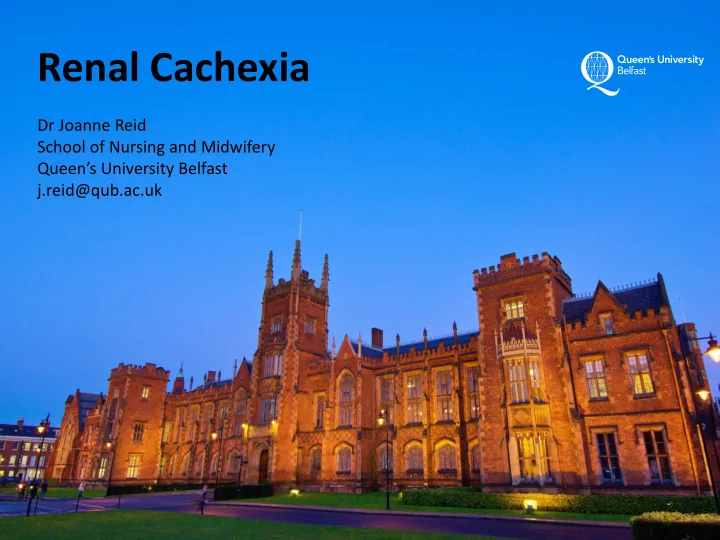

Renal Cachexia Dr Joanne Reid School of Nursing and Midwifery Queen’s University Belfast j.reid@qub.ac.uk
Cachexia • Cachexia is ‘a complex metabolic syndrome associated with underlying illness and characterised by muscle loss, with or without loss of fat ’ • Definition of cachexia in chronic illness – weight loss of at least 5% within ≤12 months or Body Mass Index (BMI) <20 kg/m 2 • plus three of the following five features: – decreased muscle strength; – fatigue; – anorexia; – low fat-free mass index; – abnormal biochemistry (increased inflammatory markers [CRP, IL-6], anaemia [Hb <120 g/L], low serum albumin [<32g/L] (Evans et al. 2008). Evans et al . (2008). Cachexia, a new definition. Clinical Nutrition 27,793 – 799 .
Pathogenesis of cachexia • Multifacorial Reduced food intake Accelerated Alterations muscle and in fat loss metabolism
Importance of the problem - cachexia Cachexia is linked with poor outcomes for the patients Presence of the cachectic syndrome, associated with any chronic disease trajectory, increases mortality is responsible for about one quarter of cancer deaths. Cachexia causes great morbidity, limits therapy No standardised ‘best treatment’ for cachexia Lack of guidelines / protocols in clinical practice
Importance of the problem – cachexia in renal disease Between 30-60% of advanced CKD patients will have cachexia – Among potential candidates to explain the high rate of morbidity and mortality and cardiovascular disease in CKD patients, cachexia continues to top the list. Limited attention has been devoted to cachexia in renal disease For renal cachexia there are no standardised definitions or inclusion criteria to help inform practice or research
Management of cachexia in renal disease • Challenging – definition needs refinement for renal population • Discriminating cachexia from other causes of malnutrition • Clinically differentiate between cachexia and Protein energy wasting as each state may require distinct management strategies
Previous cachexia work: advanced cancer population Reid et al (2009). The experience of cancer cachexia: A qualitative study of advanced cancer patients and their family members. International Journal of Nursing Studies , 46 (5), 606-616.
Renal cachexia work completed by Reid and colleagues Belfast based working group established Review paper: Reid et al. (2013). A literature review of end-stage renal disease and cachexia: understanding experience to inform evidence-based healthcare. Journal of Renal Care 39(1), 47 – 51. Consensus of defining foci and forward planning Editorial: Reid et al (2015) Defining cachexia in a renal population. Workshops (funding secured Journal of Renal Care 41(2), 79-80 . through R&D Office) Includes colleagues from UK, USA and 1) Belfast to UK working group EU (BRS conference, 2014) Planned application for NI then UK - 2) UK to International working epidemiological study group (Belfast workshop, 2014)
Working group / collaborators Starting point for working group Current working group (first publication) (last publication and grant collaborators) • Joanne Reid - QUB • Joanne Reid - QUB • Helen Noble - QUB • Helen Noble - QUB • Sam Porter - QUB • Sam Porter - QUB • Joanne Shields - BHSCT • Joanne Shields - BHSCT • Peter Maxwell - BHSCT / QUB • • Peter Maxwell - BHSCT / QUB Ken Farrington – England • Mark wright – England • Adrian Slee - England • Andrew Davenport - England • Miles Whitman - Scotland • Denis Fouque - France • David Seres – USA
• Questions? • Please contact j.reid@qub.ac.uk
Recommend
More recommend